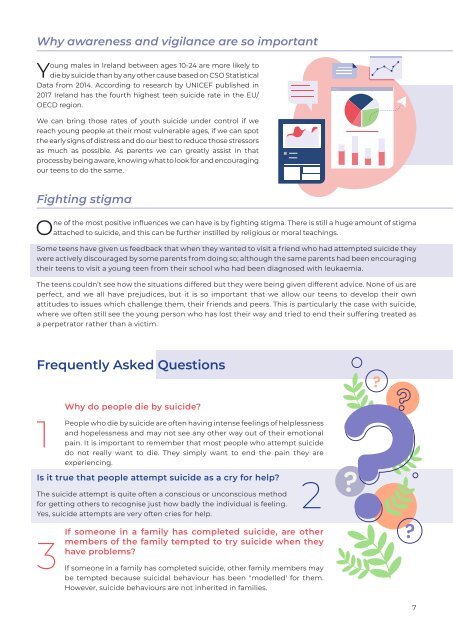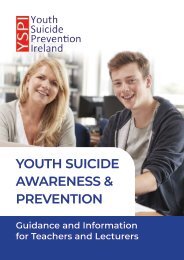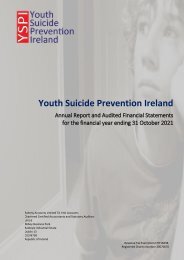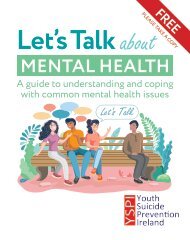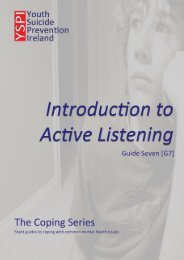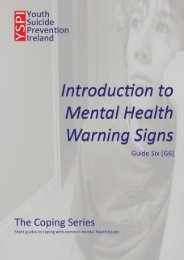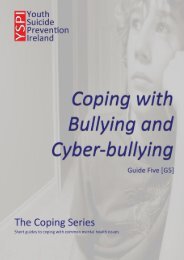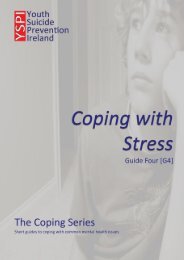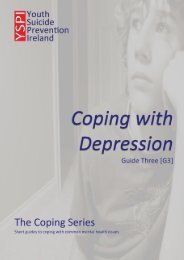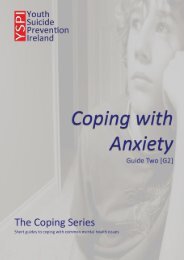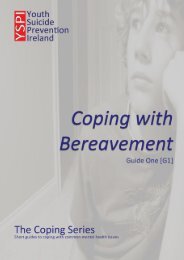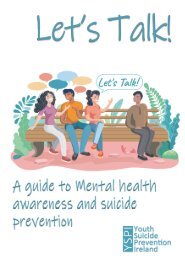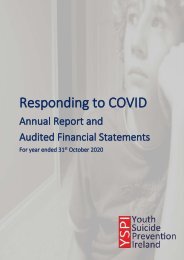What are they thinking? - YSPI Parents Handbook
A Parents Handbook to youth mental health and suicide prevention, now in it's 10th edition. Topics covered include: * Introduction to youth mental health awareness * Awareness of mental health risk factors * Recognising the symptoms of mental health issues * Helping someone with mental health issues * Understanding the dangers: Cyber-bullying Online Dangers Locked-away Syndrome * Supporting and developing coping strategies * Warnings signs of suicidal thoughts * Suicide Prevention and intervention * How to help and get help
A Parents Handbook to youth mental health and suicide prevention, now in it's 10th edition.
Topics covered include:
* Introduction to youth mental health awareness
* Awareness of mental health risk factors
* Recognising the symptoms of mental health issues
* Helping someone with mental health issues
* Understanding the dangers:
Cyber-bullying
Online Dangers
Locked-away Syndrome
* Supporting and developing coping strategies
* Warnings signs of suicidal thoughts
* Suicide Prevention and intervention
* How to help and get help
You also want an ePaper? Increase the reach of your titles
YUMPU automatically turns print PDFs into web optimized ePapers that Google loves.
Why aw<strong>are</strong>ness and vigilance <strong>are</strong> so important<br />
Young males in Ireland between ages 10-24 <strong>are</strong> more likely to<br />
die by suicide than by any other cause based on CSO Statistical<br />
Data from 2014. According to research by UNICEF published in<br />
2017 Ireland has the fourth highest teen suicide rate in the EU/<br />
OECD region.<br />
We can bring those rates of youth suicide under control if we<br />
reach young people at their most vulnerable ages, if we can spot<br />
the early signs of distress and do our best to reduce those stressors<br />
as much as possible. As p<strong>are</strong>nts we can greatly assist in that<br />
process by being aw<strong>are</strong>, knowing what to look for and encouraging<br />
our teens to do the same.<br />
Fighting stigma<br />
One of the most positive influences we can have is by fighting stigma. There is still a huge amount of stigma<br />
attached to suicide, and this can be further instilled by religious or moral teachings.<br />
Some teens have given us feedback that when <strong>they</strong> wanted to visit a friend who had attempted suicide <strong>they</strong><br />
were actively discouraged by some p<strong>are</strong>nts from doing so; although the same p<strong>are</strong>nts had been encouraging<br />
their teens to visit a young teen from their school who had been diagnosed with leukaemia.<br />
The teens couldn’t see how the situations differed but <strong>they</strong> were being given different advice. None of us <strong>are</strong><br />
perfect, and we all have prejudices, but it is so important that we allow our teens to develop their own<br />
attitudes to issues which challenge them, their friends and peers. This is particularly the case with suicide,<br />
where we often still see the young person who has lost their way and tried to end their suffering treated as<br />
a perpetrator rather than a victim.<br />
Frequently Asked Questions<br />
1<br />
Why do people die by suicide?<br />
People who die by suicide <strong>are</strong> often having intense feelings of helplessness<br />
and hopelessness and may not see any other way out of their emotional<br />
pain. It is important to remember that most people who attempt suicide<br />
do not really want to die. They simply want to end the pain <strong>they</strong> <strong>are</strong><br />
experiencing.<br />
Is it true that people attempt suicide as a cry for help?<br />
The suicide attempt is quite often a conscious or unconscious method<br />
for getting others to recognise just how badly the individual is feeling.<br />
Yes, suicide attempts <strong>are</strong> very often cries for help.<br />
2<br />
3<br />
If someone in a family has completed suicide, <strong>are</strong> other<br />
members of the family tempted to try suicide when <strong>they</strong><br />
have problems?<br />
If someone in a family has completed suicide, other family members may<br />
be tempted because suicidal behaviour has been "modelled' for them.<br />
However, suicide behaviours <strong>are</strong> not inherited in families.<br />
7


